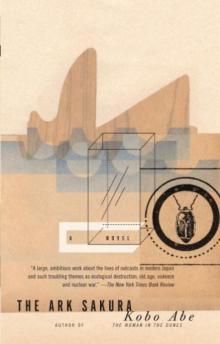The Ark Sakura Read online
Page 3
Everything in the insect dealer’s stall was packed up, backing his assertion that he had decided to quit. The left-hand stall across the way—I’ve forgotten what it was selling—had likewise ceased business. The sky threatened rain any minute, and the hour was six-twenty—almost closing time. I entered the stall from the side, ducking under the canvas, and found in place of a chair a large suitcase, which doubtless contained the rest of the eupcaccias. Overly conscious, as always, of the eyes of others, I lowered myself onto the suitcase, shoulders hunched to avoid looking conspicuous. I needn’t have worried. The few remaining shoppers went scurrying past like young crabs racing to catch the tide.
I transferred the insect dealer’s watch from my back pocket to my shirt pocket. My spirits were low—not, I thought, solely because of the weather. Was I sorry already that I had let him have the ticket? With what eagerness I had waited for and dreamed of this event—the finding of a companion—yet now that one had made his appearance, I began shrinking back. A bad habit. Must take a more positive view. He wasn’t a bad fellow in the least. A bit plain-spoken, but that was better than a lot of high-sounding talk. Not just anyone could have discovered the eupcaccia. He was probably a lot more quick-witted than he let on. The first crew member, above all, had to be far more than a mere cabin boy.
To erase any doubts, as soon as he came back from the men’s room I could inform him that I was the captain, and have him sign a form stating that once aboard, he agreed unconditionally to obey any orders to disembark. The ship was mine. I discovered her, designed her, and built her. It was only proper for the crew to fall in line with my policies. Of course if he had a mind to disobey, no mere signature was going to stop him. In which case I’d have no choice but to put my punitive system into action. Basically a defense against invaders from outside, the apparatus was capable of inflicting fatal injury; but for communal living to succeed, minimum standards of order had to be preserved. Certainly I had no plan or desire to throw my weight around as captain, but then again, it wouldn’t do to turn the ark into a great coffin.
I couldn’t keep putting off the decision. Unless I compromised somewhere, plainly I would find myself battling windmills forever. One or two people could never run a ship that size; my plans called ultimately for a crew of 385. Unless I wanted to see the ship superannuated before ever weighing anchor, I had better make up my mind to take the insect dealer on board.
The lady directly across the way (whose stall boasted a collection of thousands of different matchbooks and matchboxes, candy wrappers and whatnot) had begun packing in a hurry. Apparently annoyed by the failure of her goods to sell, she was ripping off the tarpaulin and stuffing it into her valise without even taking time to remove the thumbtacks. It was no wonder her sales were poor; the eupcaccia was eccentric in its way, but her merchandise was just too idiosyncratic. She herself, though past middle age, wore yellow sunglasses with a smart-looking kimono, for an effect somehow out of keeping with the surroundings. To make matters worse, at the bottom of her sign were the pathetic words “Mementoes of My Departed Husband,” which could only serve to put off potential customers. Perhaps the insect dealer had been right: expecting too much was indeed a sin.
The man selling a water cannon (not water pistol) at the stall on my immediate right was seated chin in hands by a peculiar machine placed directly on the floor. A tape recording recited his spiel for him while he looked resentfully up at the sky. The clouds were higher than before; now a wisp swirled fitfully by at about the speed of a helicopter. It looked as if the rain would hold off awhile longer, but no one was likely to buy a water cannon in any case. Besides, the price was too high. No sane person would part with ten million yen unless either there was solid reason to believe the price would rise further or the item was of enormous practical value. From listening to the tape, I deduced that he had based the figure solely on the number of days it had taken him to make the thing. A former employee of the Japan National Railways, he had utilized the principle of the steam locomotive. He had evidently applied for a patent, but to my layman’s way of thinking it seemed hardly likely that steam pressure could have an explosive force comparable to gunpowder. If it was a low-noise, nonpolluting, short-distance projectile he wanted, elastic could easily do the job. I didn’t think much of the design, either: an unsightly bulging coal stove, and rising out of it, a stubby cannon. It looked exactly like the male genitalia. Good for a laugh maybe, but certainly nothing I’d pay even one hundred yen for.
These people were obviously genuine amateurs, just as advertised. Their offerings roused one’s curiosity, but ultimately left one disappointed. All I could discern around me was out-and-out greed, and total lack of concern for psychology. Personally, I didn’t mind a little wool over my eyes as long as the result was sufficiently entertaining. That was where the eupcaccia shone: now there was the unmistakable touch of the professional.
A man appeared in the corner of the aisle and stopped lightly, birdlike. In the heat, as sultry as a noodle-shop kitchen, he cut a conspicuous figure in his suit coat. Even without seeing the badge on his lapel, I knew instantly that this was the same security guard who had falsely accused me over at the rest area. Had he come to stir up some new storm? I didn’t want to be hassled. With the stall cleared of merchandise, he might well stop to ask questions. I took out the remaining two tickets and placed them side by side on the counter. The plain wood surface of the counter, not one meter long, looked immeasurably vast. No reason to quail, I told myself; those cases held something of far more value than ten thousand stalls. The guard walked by without a flicker of expression. The edge of his glance swept over the counter in front of me. Sweat was dripping from the point of his chin, I noticed; I too poured rivers of sweat.
What was keeping the insect dealer? This was taking too long. Did the man have kidney stones?
A young couple stopped at the counter. The man had a crew cut, and he wore black trousers with a white, open-collared shirt. Fastened around his fat, sausagelike neck was a gold necklace. The woman’s hair was mussed, as if she’d just gone through it with her fingers; she had on purplish lipstick and a T-shirt printed with a loud Hawaiian beach scene. They had come to the wrong place. I was only putting on an act; I had nothing to sell. I started to say so, when it hit me—this was her. There could be no doubt about it: she was one of the two other people who had bought, or pretended to buy, a eupcaccia. The hair and makeup and clothes were all different, but there was no mistaking who she was. Even the insect dealer had mentioned what “class” she had, and indeed she had a striking way about her that no disguise could conceal for long.
About the man I was less sure. Was he or was he not the same person? That long hair before could have been a wig—if she wears disguises, then so does he, I told myself—but still, something didn’t connect. Perhaps offensive people leave a more superficial impression. Unfortunately, he looked ten years younger than the one before, which made him a good match for her.
“Where’s the bug man?” The man slid his fingers over the counter as if testing for dust. Uncertain how to respond, I stammered, “Uh, probably the men’s room.”
“Is he closing up, or just switching merchandise?” His fingers drummed as if hitting a telegraph key. His voice was raspy and monotonous. I knew I was under no obligation to answer, yet I did.
“Closing up. He’s given up on selling the things.”
“Why?” Wonderingly, the girl tilted her head on its slender neck. She reached casually for a ticket. “They were such cute little bugs.”
Had it been the man, I would have reacted differently. But the girl’s fingers were transparent, as if she had no bones. There seemed little enough chance that the ticket was in any danger.
“Great,” said the man. “We’re here to collect some money. Can you pay us?”
“I’m afraid business was pretty bad.”
“Oh, no, it wasn’t.” He raised his voice, as if his professional pride had been wounded. “I saw it
with my own eyes. They were selling, all right.”
The girl nodded her head rapidly in agreement. Her look was intense. It seemed possible to interpret her reaction as a sincere defense of the eupcaccia—but that was ridiculous. She was a sakura, a shill; she couldn’t be serious. It had to be an act, I knew, and yet I couldn’t suppress a rush of affection. Rather like a cat-hater who finds a kitten purring and rubbing his legs. Without thinking, I indulged in a bit of small talk, thus inadvertently handing them a pretext to stay.
“Don’t you remember me?” I said, burying my chin in the folds of my neck, prickly with heat rash, to emphasize my bulk. “I remember you.”
“I remember you too,” said the girl, bringing her hands together. Her eyes sparkled. “You’re the one who bought the eupcaccia right after us, aren’t you?”
“That’s right. That was it; that was the only one he sold.”
“What do you mean?” said the man. “We bought one too, didn’t we? That makes at least two.”
“You can stop pretending. I know everything.”
“Like what?”
“Like what you two do for a living.”
They looked at each other and laughed nonchalantly. Consternation was apparent beneath the laughter.
“What’s your relationship to him?” the man asked.
“None. I just took a fancy to the eupcaccia, that’s all.”
“Funny. Why would he go and leave the store with a total stranger?”
“Nature called.”
The girl held the ticket case to her ear and shook it. “Say, what do you suppose this is?” Her voice was clear and a bit high, with a suggestion of strain. Was she flustered at having been found out?
“Any bug that thin and flat could only be made out of paper.” His voice was raspy and heavily ironic. He rotated his right shoulder and cracked his knuckles. “These days they have to have horns, or the kids won’t buy them.”
“Eupcaccias don’t have horns,” I said.
“That’s the whole trouble with them.”
“It’s something hard,” she said. “Metallic.”
Swiftly the man reached out for the remaining case. Over my dead body. I snatched it up and pocketed it.
“Is that nice?” he demanded.
“It’s not for sale.”
“You don’t mind if I look inside, do you?” The girl glanced up at me inquiringly.
“Go on and open it if you want. It’s a free country.” The man’s tone was brusque.
She shook the contents out onto the counter. The ornamental brass key fell out with a clatter, while the thin plastic card started to fly away, caught in a puff of wind. The man slammed it down in the nick of time, as if swatting a fly; he shook off my arm, which had shot out simultaneously, and backed off with a mischievous smile. He seemed bent on playing games.
“Well, well, what do we have here? A boat ticket. A ‘Ticket to Survival,’ no less. What do you know. Looking for people to sign on?”
Bouncing the key on her palm, the girl peered at the card in her companion’s hand. “There’s a map on the back.”
Where was the insect dealer? No matter how crowded the lavatory might have been, he was taking his sweet time. It had been a good five minutes now. Wasn’t he ever coming back? Had he taken such a dislike to me that he was willing to sacrifice both his suitcase and his wristwatch for the chance to escape? The irony was that these two seemed more interested than he had been. Maybe it was all for the best. It wasn’t sour grapes; there was just no reason it had to be the insect dealer and no one else. I studied the girl, first by herself, then comparing her with her companion. Had she been alone, I would have welcomed this turn of events unconditionally.
“Pardon me for asking, but what exactly are you two to each other?” I said. “Are you business partners, or what?” It was indeed a strange question. Hearing myself ask it, I wanted to stop up my ears. The man’s smile faded, and he wiped the corner of his mouth with the back of his hand.
“I know. We’re a funny pair, aren’t we? People are always asking us that. Every time they do, I think of the saying ‘Catch big fish with little ones.’ ”
“People are always asking you that? What do you mean.”
“This person,” he said, indicating her with a jerk of his head, “seems to radiate loneliness. As if she were a pitiful waif forced against her will to do nasty men’s bidding. She stirs up men’s combativeness. It’s a kind of fishing by lure, if you follow me.”
“This person,” he had said. How much more impersonal could you be? Perhaps there was hope. Or perhaps he was only glorying in his fishing skills. The sight of him became even more irritating.
“Sorry—I don’t go in much for fishing,” I said.
Slowly the girl’s smile faded. She did have an air of loneliness about her, despite her way of glancing up at you, and the lines at either corner of her mouth, and her fairly heavy makeup. It might well be a look that was carefully contrived and calculated, I thought.
“Well, what about this merchandise? Don’t we at least get an explanation?” He flicked the card with a fingernail and spoke with rising insistency. “You can’t choose your customers; it’s not fair. Once the goods are on the counter, that’s it. You have to play fair. The bug man may have told you— half of these stalls are here only because I put in a good word for the owners with the management. That gives me a certain stake in what goes on here. I can’t have you picking and choosing among customers.”
“You don’t understand. These aren’t for sale. That’s what I’ve been telling you all along.”
“Tsk tsk. The rule is that anything displayed on the counter has to be for sale.”
“In that case, I apologize. I’m sorry. Now will you please hand it back?”
“The bug man must have told you some ridiculous story about us. That we’re a couple of sakura or something.”
“Well, aren’t you?”
“Officially, a sakura is a shill, a sidewalk vendor’s assistant—somebody who makes a purchase or lays down a bet to encourage onlookers to do the same. Only nobody calls us that anymore. The job’s no different, but we have a respectable-sounding title: sales promoters, we’re called. The department stores treat us like proper agents, with our own accounts and everything.”
The girl grasped the man’s wrist to hold it still, as the excited swaying of his body interfered with her attempts to focus on the map on the back of the card. Now was my chance. I reached out for the ticket, my fingers moving to the precise spot, at the precise speed, that I had intended. In fat people, the bottom half of the body may be weighted down, but from the waist up, heaviness is no bar to agility.
Yet I failed. The ticket was gone from between his fingers. Sleight of hand. He waved his other arm with a flourish, and the ticket reappeared, ensconced between two fingers; he blew on it, and it spun like a windmill.
“I give up. Please let me have it back,” I said. “Then we’ll talk.”
“Say, this must be pretty valuable, from the way you’re carrying on about it.”
“Didn’t use the right psychology.” The girl laughed, glancing from the card to me. “You’re just encouraging him.”
“It is valuable,” I said, in a voice so feeble that I made myself sick. “It’s worth more than anybody here could begin to afford.”
“Don’t underestimate me.”
“That’s not what I mean.” That crazy insect dealer, I thought—how long could he go on peeing? “If you don’t know how to use it, it won’t do you any good.” Nothing to do but relax and wait to be rescued. “It would be a total waste.” Still, no telling how effective his reinforcement would prove until the time came. “It’s not like ordinary merchandise, where you pay the money and it’s yours.” In terms of sheer physical strength, the insect dealer might have an edge, but in actual combat the shill would probably prove the more adept. It was a good match. If the shill had the sharpness of wire, the insect dealer had the toughness. And I myself
counted for something. Weight can be a valuable weapon, provided you use it correctly.
The girl spoke up. “A boat ticket can only mean some kind of boat. What kind, is the question.”
“The real question is the key,” said the man. “What does it unlock?”
“Finding the answer to that may be easier than you think… .“ Her voice was brightly animated, as if she were leafing through a travel brochure. Then she dangled the key roguishly near the tip of her nose. The ticket might be gone, but I at least wanted the key back. Capturing sitting flies in my bare hands is one of my hobbies. I fixed my eyes on her hand. The man had put one over on me, but with the girl I had more confidence. Still, something made me hesitate. Perhaps it was self-reproach, a warning that I was getting too emotional. The insect dealer had been utterly uninterested, yet I had gone out of my way to press a ticket on him. Now, when the shills grabbed eagerly at the bait, I found myself trying desperately to retrieve it. Mustn’t be prey to impulse. The thing to do was play for time, and wait till I could join forces with the insect dealer. Above all, I had to see that tickets to survival did not start getting scattered around out of all control.
A furious rain came lashing down, bombarding us with great pellets of water. Spray obscured visibility. The concrete floor hummed in resonance. Shoppers ran en masse for the exits, while stallkeepers raced to take in their wares.
In the confusion, the pair ran off and disappeared. There was no time even to call to them to stop. I started to chase after them, squeezing out through the side opening of the stall, when the weight of accumulated rainwater on the canvas roof caused the supports to lean. My foot got caught in the crosspiece, and I fell forward, flat on my face. A sharp pain flashed though my knee like incandescent light. Weak knees are the bane of the very fat.

 The Box Man
The Box Man Beasts Head for Home
Beasts Head for Home The Face of Another
The Face of Another The Woman in the Dunes
The Woman in the Dunes Secret Rendezvous
Secret Rendezvous The Ark Sakura
The Ark Sakura The Ruined Map
The Ruined Map